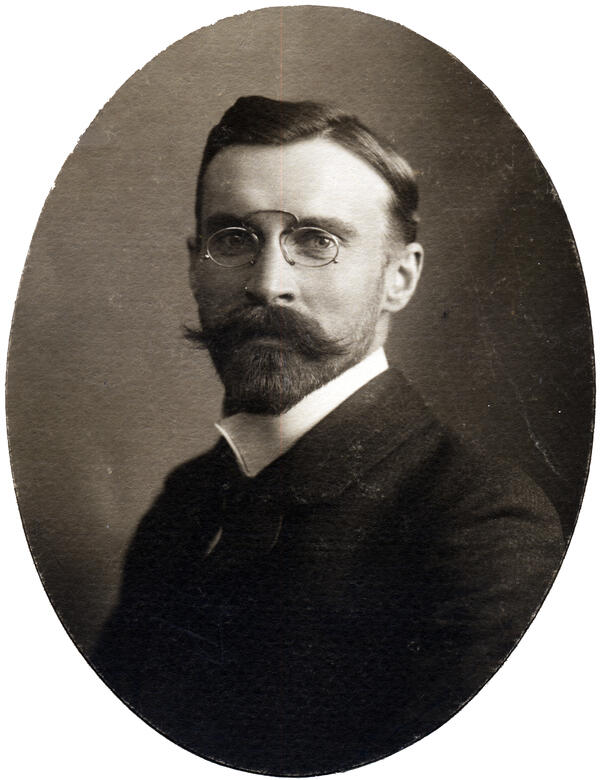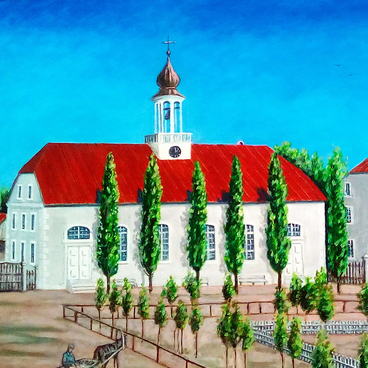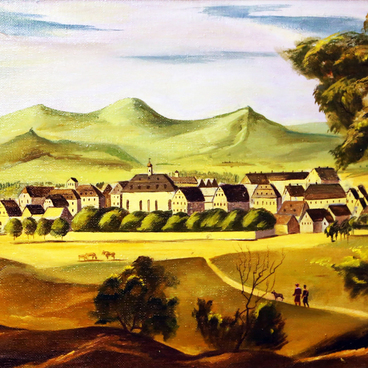Paul Glitch is the great-grandson of the founder of the Glitch dynasty, Johannes Kaspar Glitch. Paul was the last owner of the mustard plant, which made the family famous and the most powerful and wealthy in Sarepta. Of all the mustard production of the settlement, the most famous on the Russian market was the factory of the trading house ‘Heirs of J.K.Glitch’.
Paul Glitch was known as an active philanthropist. He organized a free kindergarten for the children of the plant workers in Sarepta. The costs of its construction and maintenance were borne by Glitch himself. He regularly attended kindergarten to check the conditions in which the children were kept. It was the first preschool institution in the Lower Volga region.
The Glitches have always sought to provide material assistance to the workers of their plant and to the peasants-suppliers of raw materials to the plant, as well as to the community of Sarepta. The manufacturers constructed houses and rented to the workers in need of housing.
To provide a raw material base for growing production, Glitches distributed mustard seeds free of charge to peasants in neighboring villages and counties with a guaranteed purchase of the harvest. Thanks to this, the crops of mustard in the Lower Volga region grew.
The number of workers at the Glitch plant in different years ranged from 60 to 70 people. These were residents of Sarepta, Germans from other Volga colonies, Russians, Tatars, Kalmyks from Tsaritsyn (modern Volgograd) and surrounding villages. All owners of the plant, including Paul Glitch, were personally acquainted with each worker, visited them, and helped them in cases of need, illness.
On major secular and religious holidays, the Glitches paid money bonuses to workers, gave gifts - flour, mustard oil, and sweets for children. There are known examples when the Glitches provided girls-brides - the daughters of factory workers - with a wedding dowry.
Like other colonists, members of the Glitch family were members of the brotherly community of Sarepta, so they could not stay away from her religious life. The Glitches donated large sums for the repair of the Sarepta protestant church, and also helped other community institutions.
Paul Glitch honorably continued the work of his ancestors. He not only successfully ran industrial affairs, but also continued the family tradition of charity. Glitch died in 1917, leaving no direct heirs. After the October Revolution, in 1918, the Glitch family emigrated to their historical homeland in Switzerland.
Paul Glitch was known as an active philanthropist. He organized a free kindergarten for the children of the plant workers in Sarepta. The costs of its construction and maintenance were borne by Glitch himself. He regularly attended kindergarten to check the conditions in which the children were kept. It was the first preschool institution in the Lower Volga region.
The Glitches have always sought to provide material assistance to the workers of their plant and to the peasants-suppliers of raw materials to the plant, as well as to the community of Sarepta. The manufacturers constructed houses and rented to the workers in need of housing.
To provide a raw material base for growing production, Glitches distributed mustard seeds free of charge to peasants in neighboring villages and counties with a guaranteed purchase of the harvest. Thanks to this, the crops of mustard in the Lower Volga region grew.
The number of workers at the Glitch plant in different years ranged from 60 to 70 people. These were residents of Sarepta, Germans from other Volga colonies, Russians, Tatars, Kalmyks from Tsaritsyn (modern Volgograd) and surrounding villages. All owners of the plant, including Paul Glitch, were personally acquainted with each worker, visited them, and helped them in cases of need, illness.
On major secular and religious holidays, the Glitches paid money bonuses to workers, gave gifts - flour, mustard oil, and sweets for children. There are known examples when the Glitches provided girls-brides - the daughters of factory workers - with a wedding dowry.
Like other colonists, members of the Glitch family were members of the brotherly community of Sarepta, so they could not stay away from her religious life. The Glitches donated large sums for the repair of the Sarepta protestant church, and also helped other community institutions.
Paul Glitch honorably continued the work of his ancestors. He not only successfully ran industrial affairs, but also continued the family tradition of charity. Glitch died in 1917, leaving no direct heirs. After the October Revolution, in 1918, the Glitch family emigrated to their historical homeland in Switzerland.





